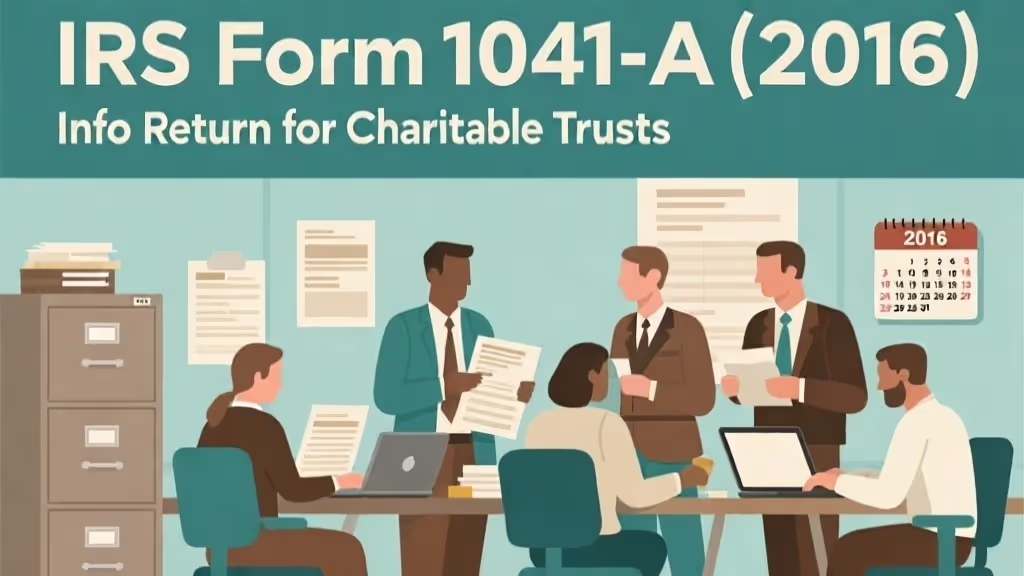IRS Form 1041-A (2016): Info Return for Charitable Trusts

What IRS Form 1041-A (2016) Is For
IRS Form 1041-A (2016) is an official form that charitable trusts use to comply with IRS filing requirements under the Internal Revenue Code. It serves as an information return that reports charitable activities and distributions, helping taxpayers fulfill their tax obligations. Filing ensures voluntary compliance and helps trustees avoid tax penalties or information return penalties for failure to file.
The trustee must file Form 1041-A for any trust that claims charitable deductions under section 642(c), unless exempt as a split-interest trust or one required to distribute all income currently. Compliance with tax law and the Internal Revenue Manual helps prevent compliance issues and penalties while supporting accurate reporting for charitable trusts.
When You’d Use Form 1041-A for 2016 (Late or Amended Filing)
You may need to file IRS Form 1041-A (2016) late or as an amended return if you receive an IRS notice, discover unreported charitable deductions, or identify a missed filing for a past tax year. Failure to file or failure to pay may result in tax penalties; however, the IRS offers penalty relief or reasonable cause relief when circumstances justify late compliance.
Penalty abatement can be granted when the taxpayer establishes reasonable cause, showing they exercised ordinary business care and acted in good faith. Relief is often available in cases of serious illness, natural disaster, unavoidable absence, or undue hardship beyond the taxpayer’s control. According to the IRS Penalty Handbook, penalty abatement is considered on a case-by-case basis, taking into account the facts and circumstances of each tax situation.
Key Rules Specific to 2016
For the 2016 tax year, IRS Form 1041-A filing requirements followed existing tax law steps for charitable trusts. The filing deadline for calendar-year filers was April 15, 2017. The late filing penalty was $10 per day, up to a maximum of $5,000, assessed separately on the trust and the trustee under Section 6652(c)(2).
Trusts can file Form 8868 to request an automatic six-month extension, ensuring timely filing or electronic filing. Submitting correct tax forms and following tax law demonstrates ordinary care and prudence in handling tax obligations. When payment is delayed, taxpayers may use Form 9465 to establish payments and maintain voluntary compliance.
Step-by-Step (High Level)
- Gather Account Transcripts: Request Form 4506-T or access IRS transcripts to verify what tax returns were filed for the past three tax years and identify missing years.
- Complete IRS Form 1041-A (2016): Use the correct tax year version of the official form, reporting all charitable deductions and distributions with payee information and purposes.
- Attach Required Schedules: Include balance sheets (Part IV) and supporting details to comply with filing requirements under tax law.
- File and Maintain Records: Mail to the IRS Service Center in Ogden, UT 84201-0027, or confirm the current filing address. Keep proof of mailing and payment records to avoid failure-to-file penalties.
- Follow Up on Processing: Monitor IRS notices or acknowledgments and confirm receipt. The locked padlock icon on IRS.gov ensures secure access when downloading tax forms or transcripts.
Common Mistakes and How to Avoid Them
- Insufficient Charitable Details: Provide specific descriptions of charitable distributions, including dollar amounts and purposes, to prevent correspondence or penalties.
- Missing Signatures: Ensure the trustee and preparer sign to comply with IRS tax law and avoid processing delays.
- Incorrect EIN or Entity Data: Verify identification numbers to prevent IRS penalties or other penalties.
- Late Extension Requests: File Form 8868 before the filing deadline to avoid failure to file penalties.
- Ignoring State Filings: Some states require separate returns, so consult a tax advisor to ensure compliance with both federal and state tax obligations.
What Happens After You File
The IRS typically processes Form 1041-A within six to eight weeks, but late or amended filings may take longer. If errors or missing details are found, you may receive IRS notices requesting clarification or imposing tax penalties. Trustees should respond promptly and maintain proof of mailing and payment records to ensure transparency and accountability.
Taxpayers who establish reasonable cause may qualify for penalty abatement or interest relief, primarily if failure to file or failure to pay resulted from a serious illness, loss of records, or a natural disaster. Requests are generally granted when the taxpayer exercises ordinary care and acts without willful neglect.
FAQs
What penalties apply for filing Form 1041-A late for 2016?
Late filing penalties under section 6652(c)(2) are $10 per day, up to $5,000. Failure to file penalties may also apply, but penalty relief or first-time abatement may be available if you acted with ordinary business care and good faith.
Can I still get transcripts for a 2016 charitable trust?
Yes, you can request IRS transcripts using Form 4506-T to verify filings for the past three tax years. These transcripts help confirm whether the trust has any compliance issues or missing tax returns.
How do I request penalty relief for reasonable cause?
Submit a written statement explaining all the facts and circumstances that prevented timely filing or payment. The IRS will review whether you exercised ordinary care and prudence and may grant penalty relief if due to reasonable cause.
What if the trust distributed all assets before discovering the filing requirement?
You must still file IRS Form 1041-A for any tax year when charitable deductions were claimed. Mark the return “Final” and ensure all distributions are reported accurately to comply with IRS law and avoid other penalties.
Can I get an abatement for estimated tax or other penalties?
Specific penalties, such as the estimated tax penalty or failure-to-pay penalty, may qualify for tax penalty abatement or interest relief. Requests are reviewed individually based on the taxpayer’s control, good faith, and the Internal Revenue Code provisions.







